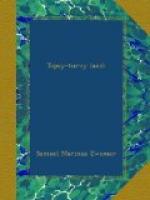XIV
BOAT-BUILDERS AND CARPENTERS
Sinbad the sailor died long ago but the sea he sailed is still called the Persian Gulf and is just as full of curious islands as it was in his time. The boats are also just like Sinbad’s and the sailors sing the same songs, I think, for there are very few changes in the almost changeless East. The Bahrein harbour-boat is built on the islands, out of timber from India and masts from Ceylon. But the sailcloth and the ropes are made on this our island home. All boats of this kind carry a good lot of passengers, draw very little water and are fast sailing craft; so that even the American boy whose father owns a yacht would not speak with contempt of one of these boats. In fact I have heard English sea captains who had drunk salt water for years say that they never saw better harbour boats in a storm than these of Bahrein.
[Illustration: CARGO BOATS, BAHREIN.]
In another kind of boat the pearl-divers of the Gulf go out to their hard toil and costly labour. One of them costs about four hundred rupees, that is about one hundred and thirty dollars. You do not think that is dear, do you, for a boat that holds a crew of twenty? But the cost of diving for pearls is not in the boat or the apparatus; it costs lives. Many of the divers are eaten by sharks before they return with the year’s pearl harvest; others lose limbs and health. I wish you could see the odd shaped oars the Arabs use in these boats. They consist of a round pole with a sort of barrel-head or spoon shaped board tied to one end. The boat builders always use twine and rope rather than nails or screws to put their boats together. The boys of Bahrein can make beautiful sailing boats to play with out of bits of date-stick and strings.
[Illustration: RIVER BOAT, BUSRAH.]
Each fishing boat has a sort of figure-head and this is generally covered with the skin of a sheep or goat. This animal is sacrificed on the day when the boat is first launched, just as we give the boat a name and put flags on it. It is a very old custom to offer a blood sacrifice when a boat is first put into the water.
Not only in the villages on the coasts of the Red Sea and the Persian Gulf are there boat builders and sailors; Arabia has two large rivers that help to make its northern boundary and they are highways of traffic.
Our picture shows a river boat on the canal at Busrah. It goes the long journey from Busrah to Bagdad over five hundred miles or even to Hillah and the other towns on the Euphrates river. This kind of boat has a cabin in the bow and can carry a large cargo of wheat or wool. It sails by all the interesting country which was once the home of Abraham and is still called Mesopotamia.
The largest boats used by the Arabs are called dhows or buggalows. You will hear something more about these boats in the chapter on the slave trade.




